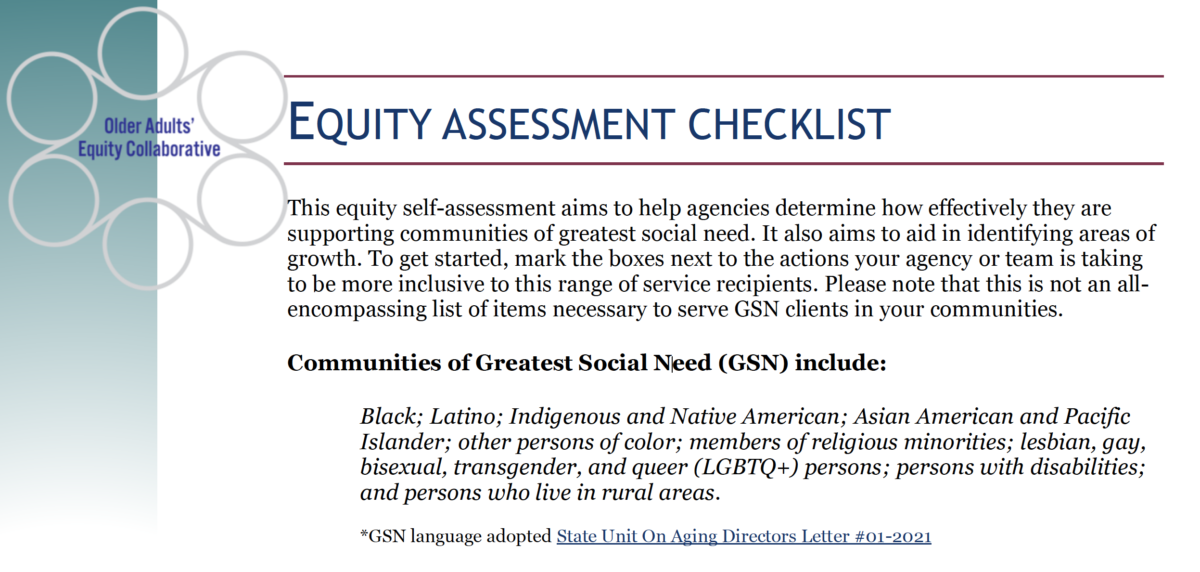Read More
Since 2020, the Administration for Community Living (ACL)-funded Older Adults’ Equity Collaborative (OAEC) has worked to elevate cultural competence in the aging network through active engagement with professionals, caregivers, and older adults. This capstone event will reflect on the accomplishments of this collaborative by introducing attendees to the resources and tools generated by the OAEC and look ahead by stimulating conversation on the future of equity in the aging network.
Read More
The National Alliance for Caregiving conducted structured interviews with professionals from patient advocacy groups and diverse family caregivers caring for someone who had been diagnosed with heart disease, blood cancer, lung cancer or lupus, conditions that are known to disproportionately affect diverse communities. We wanted to better understand how culture and identity affects the way caregivers provide care, access culturally responsive supports and resources, and how caregivers engage with patient advocacy groups.
With the guidance of a panel of disease representative patient advocacy organizations, these findings shaped the content of this guide and supported the need for sections detailing the research findings, articulating what diverse caregivers say about their experiences, and offering tips for both advocating for and empowering diverse caregivers. What Providers Should Know: Factsheets About Diverse Family Caregivers, was contributed by the Diverse Elders Coalition and offers supporting evidence documenting the unique needs of diverse caregivers.
Read More
In this article the authors report survey results from Title VI directors regarding how AI/AN/NHs learn about ACP. Most participants reported that less than a quarter of older AI/AN/NHs had an advance care plan and that most congregate meal sites would be open to providing ACP information.
Read More

This equity self-assessment aims to help agencies determine how effectively they are supporting communities of greatest social need (GSN). It also aims to aid in identifying areas of growth. To get started, mark the boxes next to the actions your agency or team is taking to be more inclusive to this range of service recipients.
Read More
Cultural norms and values can impact the way Hispanic/Latino caregivers care for their loved ones. This series of worksheets and accompanying videos was created in collaboration with our partners at Trualta. They are designed for caregivers to identify how cultural values and norms affect their caregiving, help identify which values are important to them, and ways to implement those values in their daily lives as caregivers. Each worksheet has an accompanying video which features interviews with actual caregivers sharing their experiences to help reflect on how different values affect caregiving, and guidance on how these values can also help self-care for caregivers.
Read More
Social isolation is defined as a lack of social connections. Social isolation can lead to loneliness in some people, while others can feel lonely without being socially isolated, according to the Centers for Disease Control and Prevention (CDC). These fact sheets provide insight and best practices for addressing social isolation among American Indian Elders.
Read More
Black and Aging in America© presents summaries, statistics, and perspective on the status of Older African Americans. By examining social, economic, health and other indicators, in comparison to other racial and ethnic groups, this report illustrates progress as well as the many challenges that remain.
Some organizations, academic studies, and government agencies consulted for this report define seniors as over age 55. However, unless otherwise noted, this report reflects information on the 65-and-older cohort. Black and Aging in America© condenses this broad spectrum of information into one simplified presentation—a readily accessible portrait of the status of Older African Americans.
Read More